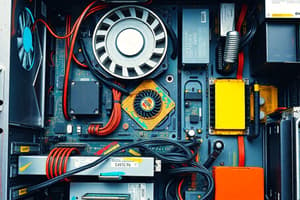Podcast
Questions and Answers
What is the first step demonstrated by the speaker in disassembling the PC?
What is the first step demonstrated by the speaker in disassembling the PC?
- Removing the power supply
- Disconnecting power cords from case fans
- Disconnecting all components from the system board
- Unscrewing thumb screws to remove the case cover (correct)
Which cable type is mentioned for connecting the hard drive and power supply to the motherboard?
Which cable type is mentioned for connecting the hard drive and power supply to the motherboard?
- VGA cables
- HDMI cables
- SATA cables (correct)
- DVI cables
What must be done before removing the power supply in the disassembly process?
What must be done before removing the power supply in the disassembly process?
- Unscrewing thumb screws
- Removing the hard drive
- Removing the motherboard
- Disconnecting power cords from case fans (correct)
Which component requires unscrewing and sliding out after disconnecting power and SATA cables?
Which component requires unscrewing and sliding out after disconnecting power and SATA cables?
What is essential when reinstalling the processor according to the speaker's tips?
What is essential when reinstalling the processor according to the speaker's tips?
Which piece of hardware requires sliding out to the front of the case during disassembly?
Which piece of hardware requires sliding out to the front of the case during disassembly?
Which ports and connectors are detailed by the speaker on the system board?
Which ports and connectors are detailed by the speaker on the system board?
Flashcards
First disassembly step?
First disassembly step?
Unscrew thumb screws on the rear to detach and remove the case cover.
Hard drive connection?
Hard drive connection?
SATA cables are used to connect these to the motherboard and power supply.
Before removing power supply?
Before removing power supply?
Disconnecting the power cords from case fans.
Hard drive removal?
Hard drive removal?
Signup and view all the flashcards
Processor Reinstallation?
Processor Reinstallation?
Signup and view all the flashcards
Motherboard removal?
Motherboard removal?
Signup and view all the flashcards
System board ports?
System board ports?
Signup and view all the flashcards
Study Notes
- The speaker demonstrates how to disassemble a standard PC, starting by removing the case cover by unscrewing thumb screws and sliding it back.
- Inside the computer, key components include the power supply, processor fan, heat sink, hard drive, CD ROM, and motherboard.
- SATA cables are used to connect the hard drive and power supply to the motherboard.
- The process involves disconnecting power cords from case fans, system board, and other components before removing the power supply by unscrewing it.
- To remove the hard drive, the speaker unscrews it and slides it out after disconnecting the power and SATA cables.
- Removing the system board requires disconnecting all components tied to it, removing screws, and sliding it out to the front of the case.
- The speaker details the various ports and connectors on the system board, such as power, IDE, SATA, PCI slots, video ports, USB ports, audio ports, Ethernet connector, and memory sockets.
- After disassembling, the speaker demonstrates how to reassemble the PC by putting back the components in reverse order, securing them with screws, and reconnecting power and data cables.
- Tips include adding thermal paste when reinstalling the processor and ensuring proper alignment and connection of all cables to their respective ports on the system board.
- The process concludes with reattaching the power supply, plugging in power connectors, connecting audio, USB, and other cables to the system board, and securing everything in place before reassembling the case cover.
Studying That Suits You
Use AI to generate personalized quizzes and flashcards to suit your learning preferences.



